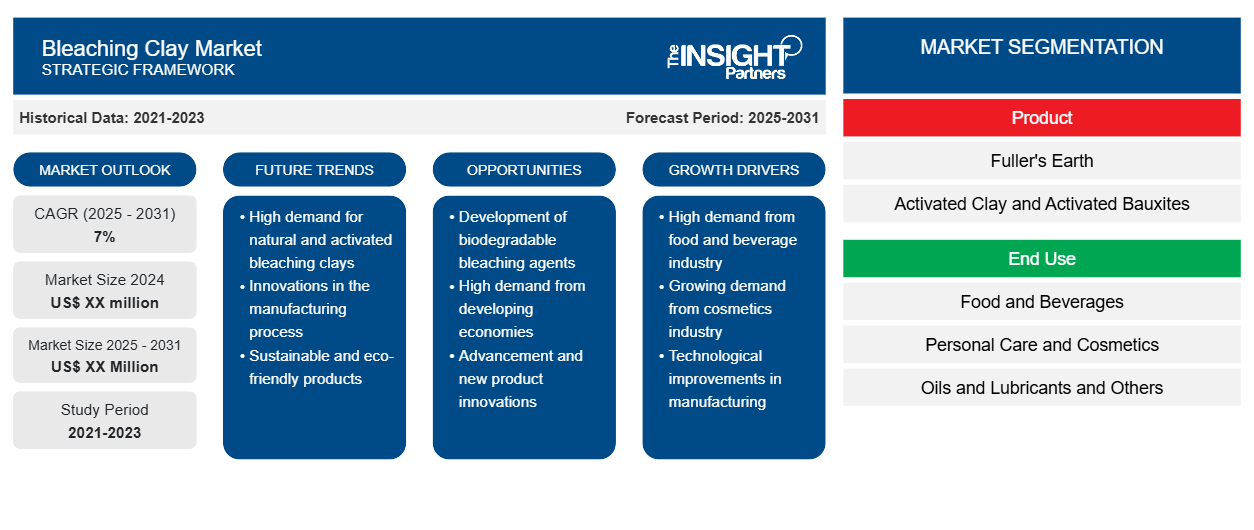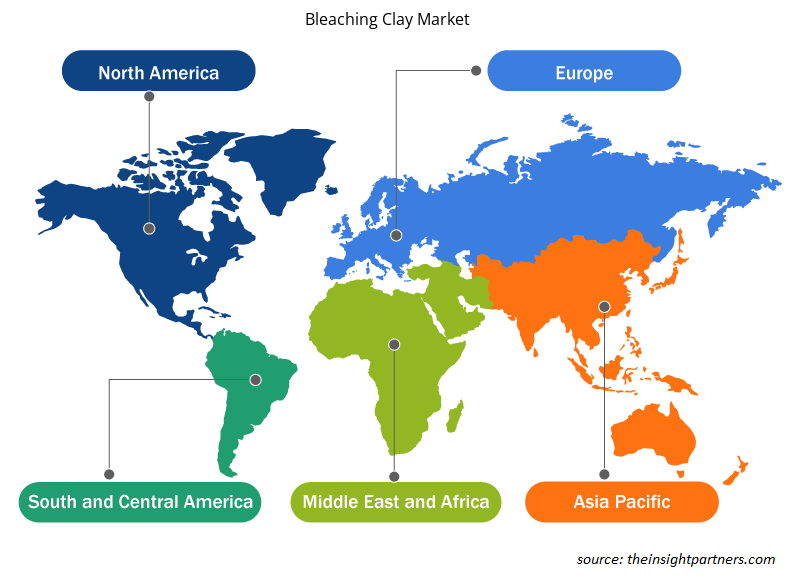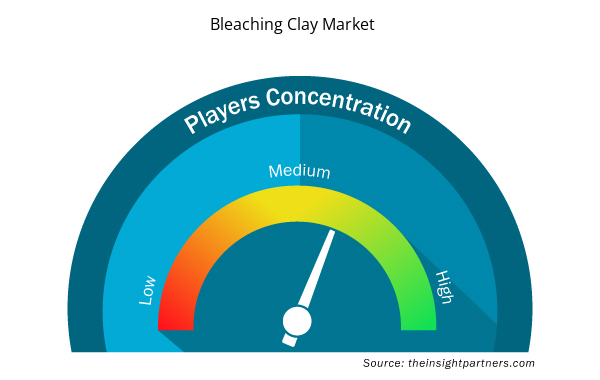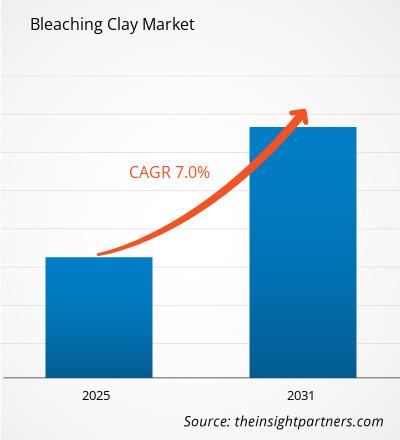The bleaching clay market size is projected to reach US$ 2.24 billion by 2031 from US$ 1.38 billion in 2023. The market is expected to register a CAGR of 6.2% during 2023–2031. The growing demand for purifying renewable fuels is likely to bring in new key trends in the bleaching clay market.
Bleaching Clay Market Analysis
Natural oils are often incorporated into cosmetic products to provide a moisturizing effect on the skin. However, these oils may contain impurities and pigments that may negatively affect the cosmetic formulations. Bleaching clay is, therefore, used as a key ingredient to purify natural oils and waxes. It has excellent adsorption properties to remove impurities. In order to adhere to stringent quality standards, premium skincare, and beauty brands mandate the purification process in the production of their products. Further, the demand for high-quality, purified ingredients in cosmetic formulations has increased due to the shift in consumer preference toward natural and sustainable beauty solutions. Thus, manufacturers in the personal care & cosmetics sector are increasingly opting for sustainable practices, owing to which bleaching clay is largely preferred to meet the demands.
Bleaching Clay Market Overview
The demand for processed and packaged foods has grown significantly across the world due to fast-paced, hectic lifestyle coupled with time constraints. Most processed foods contain edible oils to increase the shelf-life of the items. As edible oil is a key ingredient in these food products, bleaching clay plays an essential role in refining edible oils and enhancing their color. Apart from refining oils, bleaching clay is also used in purifying cosmetics in order to meet quality standards. Countries in Asia Pacific witness a high inclination toward skincare and beauty products due to growing awareness of the benefits of natural oils used in cosmetics. Thus, the aforementioned factors are driving the growth of the bleaching clay market in Asia Pacific.
Customize This Report To Suit Your Requirement
You will get customization on any report - free of charge - including parts of this report, or country-level analysis, Excel Data pack, as well as avail great offers and discounts for start-ups & universities
Bleaching Clay Market: Strategic Insights

- Get Top Key Market Trends of this report.This FREE sample will include data analysis, ranging from market trends to estimates and forecasts.
Customize This Report To Suit Your Requirement
You will get customization on any report - free of charge - including parts of this report, or country-level analysis, Excel Data pack, as well as avail great offers and discounts for start-ups & universities
Bleaching Clay Market: Strategic Insights

- Get Top Key Market Trends of this report.This FREE sample will include data analysis, ranging from market trends to estimates and forecasts.
Bleaching Clay Market Drivers and Opportunities
Surging Adoption of Bleaching Clay Across Food and Beverage Sector to Favor Market
From cooking oils to processed foods, oils and fats play a crucial role in the food sector. However, these oils can negatively impact the quality and appearance of the final products if impurities and pigments are not eliminated. Moreover, as consumers are increasingly mindful of the quality of the products they consume, manufacturers are investing in processes that ensure the purity and aesthetic appeal of their food items. This scenario has promoted the use of bleaching clay to remove the unwanted odor, color, and impurities from oils. The use of bleaching clay in oil refining enhances the visual appeal of oils and improves their shelf life and stability. It plays a crucial role in product consistency and longevity. Moreover, the versatility of bleaching clay extends beyond oils and various food-related applications. It is employed in the purification of waxes and other ingredients used in food processing. The ability of bleaching clay to effectively remove impurities aligns with the industry's commitment to delivering clean-label products that meet the demands of health-conscious consumers.
Rising Demand for Sustainable Fuels
The rising demand for sustainable fuels presents significant growth opportunities for the bleaching clay market, driven by the need for effective purification solutions in the production of biodiesel and other renewable energy sources. As governments and industries worldwide increasingly prioritize environmental sustainability and seek alternatives to fossil fuels, there is a growing demand for biodiesel derived from renewable feedstocks such as vegetable oils, animal fats, and recycled cooking oils. Bleaching clay plays a crucial role in the production of biodiesel by removing impurities and contaminants from the feedstock oils, thereby improving the quality and performance of the final product. The purification process involves the adsorption of pigments, free fatty acids, moisture, and other undesirable substances that can adversely affect the biodiesel's stability, efficiency, and emissions profile. By employing bleaching clay in the refining process, biodiesel producers can ensure compliance with stringent quality standards and enhance the overall sustainability of their operations.
Bleaching Clay Market Report Segmentation Analysis
Key segments that contributed to the derivation of the bleaching clay market analysis are product and end use.
- Based on product, the bleaching clay market is segmented into fuller's earth, activated clay, and activated bauxites. The activated bauxites segment held the largest market share in 2023.
- By end use, the market is categorized into food & beverages, personal care & cosmetics, oils & lubricants, and others. The food & beverages segment held the largest share of the market in 2023.
Bleaching Clay Market Share Analysis by Geography
The geographic scope of the bleaching clay market report is mainly divided into five regions: North America, Asia Pacific, Europe, Middle East & Africa, and South & Central America.
Asia Pacific has dominated the market. As the consumption of processed and packaged foods continues to rise, there is a growing need for high-quality edible oils. Bleaching clay plays a crucial role in the refining process, helping remove impurities and undesirable colors and ensuring that the final edible oils meet the stringent quality standards set by the industry. In addition, Asia Pacific's pharmaceutical and cosmetic industries contribute to the demand for bleaching clay. The purification of oils and waxes used in pharmaceuticals and cosmetics is essential to meet the stringent regulatory requirements and ensure the production of high-quality products. Bleaching earth serves as a reliable agent in achieving these purification standards. As industries continue to prioritize product quality, environmental sustainability, and innovation, the demand for bleaching clay is expected to remain on an upward trajectory in the years to come, making Asia Pacific a key growth market for the industry.
Bleaching Clay Market Regional Insights
The regional trends and factors influencing the Bleaching Clay Market throughout the forecast period have been thoroughly explained by the analysts at Insight Partners. This section also discusses Bleaching Clay Market segments and geography across North America, Europe, Asia Pacific, Middle East and Africa, and South and Central America.

- Get the Regional Specific Data for Bleaching Clay Market
Bleaching Clay Market Report Scope
| Report Attribute | Details |
|---|---|
| Market size in 2024 | US$ XX million |
| Market Size by 2031 | US$ XX Million |
| Global CAGR (2025 - 2031) | 7% |
| Historical Data | 2021-2023 |
| Forecast period | 2025-2031 |
| Segments Covered |
By Product
|
| Regions and Countries Covered | North America
|
| Market leaders and key company profiles |
Bleaching Clay Market Players Density: Understanding Its Impact on Business Dynamics
The Bleaching Clay Market market is growing rapidly, driven by increasing end-user demand due to factors such as evolving consumer preferences, technological advancements, and greater awareness of the product's benefits. As demand rises, businesses are expanding their offerings, innovating to meet consumer needs, and capitalizing on emerging trends, which further fuels market growth.
Market players density refers to the distribution of firms or companies operating within a particular market or industry. It indicates how many competitors (market players) are present in a given market space relative to its size or total market value.
Major Companies operating in the Bleaching Clay Market are:
- Clariant International Ltd
- EP Engineered Clays Corporation
- HRP Industries
- Musim Mas Group
- Ashapura Perfoclay Limited
- Taiko Clay Marketing Sdn. Bhd
Disclaimer: The companies listed above are not ranked in any particular order.

- Get the Bleaching Clay Market top key players overview
Bleaching Clay Market News and Recent Developments
The bleaching clay market is evaluated by gathering qualitative and quantitative data post primary and secondary research, which includes important corporate publications, association data, and databases. A few of the developments in the bleaching clay market are listed below:
- Shell Eastern Petroleum (Pte) Ltd, a wholly-owned subsidiary of Shell plc (Shell), announced it has acquired EcoOils Limited (EcoOils), a waste oil recycling firm. This acquisition is part of Shell's ambition to increase the production of sustainable low carbon fuels for transport, including sustainable aviation fuel. (Source: Shell Plc, Company Website, 2022)
Bleaching Clay Market Report Coverage and Deliverables
The "Bleaching Clay Market Size and Forecast (2021–2031)" report provides a detailed analysis of the market covering below areas:
- Bleaching clay market size and forecast at global, regional, and country levels for all the key market segments covered under the scope
- Bleaching clay market trends as well as market dynamics such as drivers, restraints, and key opportunities
- Detailed PEST/Porter’s Five Forces and SWOT analysis
- Bleaching clay market analysis covering key market trends, global and regional framework, major players, regulations, and recent market developments
- Industry landscape and competition analysis covering market concentration, heat map analysis, prominent players, and recent developments for the bleaching clay market
- Detailed company profiles
- Historical Analysis (2 Years), Base Year, Forecast (7 Years) with CAGR
- PEST and SWOT Analysis
- Market Size Value / Volume - Global, Regional, Country
- Industry and Competitive Landscape
- Excel Dataset



Report Coverage
Revenue forecast, Company Analysis, Industry landscape, Growth factors, and Trends

Segment Covered
Product, and End-Use

Regional Scope
North America, Europe, Asia Pacific, Middle East & Africa, South & Central America

Country Scope
This text is related
to country scope.
Frequently Asked Questions
Advanced processing technologies is expected to be the key market trends
Based on geography, Asia Pacific held the largest share of the bleaching clay market due to increasing demand for refined oils and fats across various industries, including food processing and cosmetics
Based on product, the fuller's earth segment is expected to witness the fastest growth during the forecast period
Growing demand of bleaching clay for vegetable oil refining and expansion of cosmetics industry is driving the market growth
BASF SE; AMC; GlobeCore GmbH; Clariant; HRP Industries are some of the key players operating in the bleaching clay market
The Bleaching Clay Market is estimated to witness a CAGR of 7% from 2023 to 2031

 Get Free Sample For
Get Free Sample For